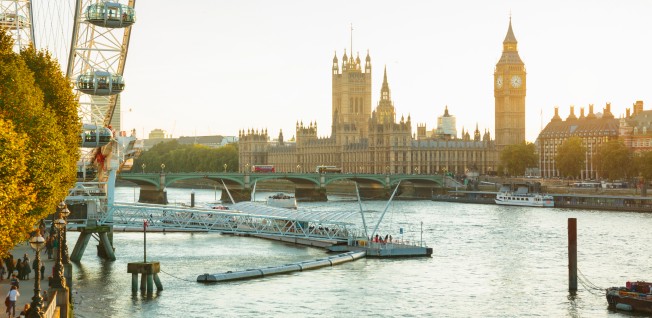From Career Woes to Pension Concerns — Expat Voices about Brexit
In June 2016, people in the UK voted on whether they wanted their country to remain in the European Union. Although the result of the referendum — 51.9% voted to leave the EU — wasn’t legally binding, the government put the official process of leaving the European Union in motion in March 2017. A lot has happened since then, and while the world has watched the political upheaval with a mixture of concern, incredulity, and stunned amusement, the official end of the withdrawal process might be coming to a close soon.

For EU expats living in the UK and UK citizens living abroad, Brexit might cause a lot of changes to their current circumstances. Some worry about their career or the state of the economy, while others are unsure about the future of their family. According to the Expat Insider 2019 survey, 42% of expats in the UK are also unhappy with the political stability in the country. Although the details of a possible deal or the ramifications of a potential no-deal Brexit are still unclear, many expats and global minds are very much concerned about the outcome.
Reduced Income & Dwindling Career Opportunities for Expats
The effects on their careers or businesses are among the biggest worries for many expats. Not only will trading with EU countries most likely become more complicated for UK companies, but some also worry about the impact Brexit will have on their salary and their freedom to pursue an international career.
Tom, a British expat living in South Korea, moved abroad for his career, as he believes gaining experience from a foreign country is pivotal in this day and age. Brexit is one of the main reasons why he doesn’t plan to move back home in the foreseeable future. “I believe that if the UK goes ahead with Brexit, then it will be effectively shutting itself off from the rest of the world, and it would become much more difficult to gain international opportunities.”
Working for the British government in Thailand, one InterNations member can already see some negative effects of the political situation of the previous years. The weakening GBP has reduced his income slightly and, of course, he is concerned about how the situation will affect his job situation. “The UK government may look to hire more locally engaged staff worldwide rather than send people from the UK such as myself, which would have huge implications for my career,” he points out. With these personal concerns weighing on him, he is bracing himself for the Brexit aftermath: “I expect my workload to increase, and pay and benefits package to decrease, as a result of Brexit and post-Brexit pressures.”

Michael, another expat in Thailand, works for a British multinational company and has also noticed that the spending power of his paycheck has diminished. As the October deadline draws closer, he anticipates some problems when it comes to returning home: “Neither I nor anyone at the company, nor apparently anyone in government, knows whether — nor how easily — I will be able to travel back to the UK for work-related meetings.” Fortunately, Michael has already planned to circumvent any chaos at the airport by leaving the UK before 31 October. “My wife and I have already decided not to return to the UK when my contract here expires,” he adds. “I like my job and the company for which I work, and I don’t anticipate any problems obtaining a visa.”
Concerns about the Quality of Life in a Post-Brexit UK
Even expats and global minds who do not worry about their career are concerned about the quality of life in a post-Brexit UK. Victoria and her Norwegian husband had always thought about moving to Norway after they retired, but Brexit made them organize their move abroad much sooner than anticipated. However, this decision has also had its drawbacks: “We found that it was impossible to sell our house in the UK as the property market has collapsed.”
Still, making this move seemed like a necessary step. “My husband began to feel unwelcome in the UK, especially as he was working for a Spanish bank,” Victoria says. He is not the only one who struggles to feel at home in the UK: in the Expat Insider 2019 survey, the country ranks 45th (out of 64) for the ease of settling in, and 28% of respondents rate the attitude towards foreign residents negatively (compared to 19% globally). However, feeling unwelcome wasn’t the only thing Victoria and her husband worried about: “We had also grown concerned about the lack of investment in education and healthcare in the UK among other things.”
One British expat in Thailand has also been concerned about the future of his family ever since the referendum: “If the economic situation worsens, it’ll lead to more government cuts to services like schools and hospitals, which will affect my children's education and health.” A possible rise of the cost of living and government cuts to police forces and social services are other factors which make expats feel uneasy about returning to the UK. Some even anticipate higher crime rates, a rise in unemployment, and other social problems after Brexit.
Multi-National Families at a Disadvantage?
For Paul, who lives in the Netherlands, the situation could become quite dire after Brexit: he is British, but his wife and children are Dutch. While his family’s status in the Netherlands is secure, Paul will have to wait and see how his residency, which is that of a European citizen, will be affected by Brexit. “Nobody, not even the Dutch immigration service, knows what is going to happen next,” Paul says. Right now, there are more questions than answers for him: “My passport is only a year old. Do I have to apply for a new one after Brexit? And what rights will I then have as a Brit living in the European Union?”

For Philip, who currently lives in Malta, Brexit may also be the cause of some major changes in his family life if he should be forced to return to his home country. His wife, who is Chinese, might not qualify for a UK visa. “So, there is a chance that we will be split up!” Philip says.
Getting a visa or permanent residence permit can be difficult for non-EU spouses. Only if their British partner meets the financial requirements and can provide proof of 18,600 GBP a year in base earnings, can the non-EU spouse join them in the UK. So far, EU and EEA nationals have enjoyed freedom of movement and didn’t have to provide any proof of income or residency. But with Brexit on the horizon, this might well be subject to change.
British Pensions: Devalued, Decreased, or Even Dropped?
Many British people living abroad are pensioners: according to the Expat Insider 2019 survey, 7% of British respondents relocated to retire abroad, more than double the global average of 3%. As they typically receive a British pension, there is a lot of uncertainty among them as to what will happen to their retirement funds and how Brexit will affect their quality of life abroad.
“My pension is 80% Dutch and 20% British,” Paul points out. “After Brexit, I understand that my British pension will be reduced by 25% because of British taxes.” What sounds like a small amount can have a huge effect on a pensioner’s budget.
Mervyn, who is spending his retirement in Lithuania, is also very worried about the financial aspects of Brexit, especially a no-deal Brexit. The effects are already palpable: “Prior to the Brexit referendum, the GBP to EUR exchange rate was 1.0 GBP =~ 1.4 EUR, now it is 1.0 GBP =~ 1.1 EUR. And it’s likely to decease further especially if there is a ‘no-deal’.” According to Mervyn, his pensions have already decreased by about 30% in recent years.
A French expat who lived in the UK and has now moved on to the Czech Republic points out that, after Brexit, the UK might not have to apply European rules concerning the payment of pension. “This means that I will have lost 4 years of contributing to the British system.” The British parliament’s human rights committee has also warned that “the EU Withdrawal Bill will remove all EU free movement of persons rights, without addressing the rights of those who currently benefit from these rights under EU law, or social security rights”.
It is not yet clear how social security and pension payments will be handled after Brexit, so EU expats who live in the UK or have formerly worked in the UK don’t know if they will lose access to benefits that they were previously entitled to. Brits who live abroad might also face a lot of uncertainty when it comes to their social security and pension. In case of a no-deal Brexit, it will be up to expats’ individual host countries to establish their rights. While some countries have started to work out solutions regarding visas and residence permits, it is still unclear if there will be reciprocal arrangements addressing healthcare, social security, and pensions.

Citizenship and Settled Status as a Solution
Although it is possible that a withdrawal from the EU will influence the residence status of British expats living in other EU countries, for many this has not been a big reason for concern.
“The worst thing that could happen is that I would have to leave Lithuania. But this is unlikely, because I have heard via the British Embassy in Vilnius that the Lithuanian Immigration Agency will not cause too many problems,” Mervyn says. “I only have to exchange my permanent residence permit from an ‘EU National’ to a ‘British’ one. Luckily, the British Embassy in Vilnius is being helpful.”
Jonathan had originally planned to move his expat family back to the UK after living in Sweden and the US for a while, but after the 2016 referendum, these plans rapidly changed. Instead of returning to their home country, Jonathan and his family applied for Swedish citizenship, sold their property in the UK, and moved their remaining savings out. “Currently, we have no plans to move back to the UK,” Jonathan says. “Not until either our children leave home in 5 to 10 years or until the UK’s political situation and economy look like they're stabilizing and improving.”
Applying for citizenship is also what other expats plan on doing: “Fortunately, I had an Irish grandfather, so I will change nationality if needed,” says Philip in Malta. And one expat from Denmark adds, “I'm a permanent resident and for a number of reasons haven't applied for Danish citizenship, but I'm doing what I can to get official recognition of my status.”
Since March 2019, expats from EU countries living in the UK can also apply for settled status, which would grant them the right to stay in the country after 31 December 2020, which is the current cut-off point in case of a no-deal Brexit.
Theoretically, you only have to provide proof that you have lived in the UK continuously for at least five years. However, according to reports from various expats who are undergoing this process, providing this proof seems difficult if your life hasn’t followed a clear path — this can apply to people who are full-time caretakers of family members or stay-at-home parents and who cannot provide bank account details and/or work contracts.
Organizations such as Settled and the3million try to support EU and EEA nationals and provide information on what to expect when applying for settled status.
This article has been published on 17 October 2019. The open-access poll that it is based on was conducted in August 2019.











